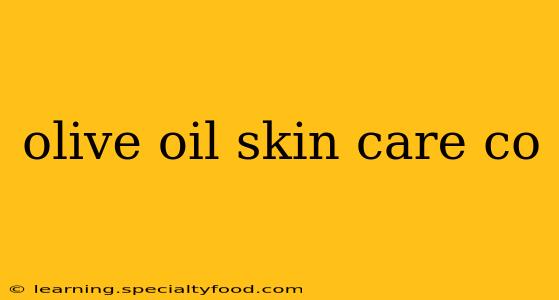Olive oil, a staple in kitchens worldwide, is also a powerhouse ingredient in skincare. For centuries, cultures across the Mediterranean have harnessed its beauty benefits, and now, modern science is confirming what tradition has long known: olive oil is remarkably effective for a variety of skin concerns. This comprehensive guide delves into the properties of olive oil for skin, its various applications, and answers common questions about its use in a skincare routine.
What are the benefits of olive oil for skin?
Olive oil's skincare prowess stems from its rich composition of fatty acids, antioxidants, and vitamins. Specifically, the abundance of oleic acid, a monounsaturated fatty acid, contributes to its moisturizing and anti-inflammatory properties. This helps to soothe irritated skin, reduce redness, and improve the skin's barrier function, keeping it hydrated and protected from environmental stressors. The antioxidants, like vitamin E, combat free radical damage, contributing to anti-aging effects and preventing premature wrinkles. Vitamin A and K are also present, further bolstering its skin-rejuvenating capabilities.
Is olive oil good for acne-prone skin?
This is a common question, and the answer is nuanced. While olive oil is incredibly moisturizing, its comedogenic rating (the likelihood of clogging pores) is relatively low for many individuals. However, those with severely acne-prone skin, particularly those prone to breakouts from oily products, might find olive oil too heavy for their skin. It's crucial to perform a patch test before applying olive oil to the entire face. Start with a small amount on a discreet area and observe for any reaction over 24-48 hours. If you experience breakouts or increased inflammation, olive oil might not be suitable for your skin type. For acne-prone skin, consider using olive oil sparingly, focusing on drier areas, or opting for a diluted version mixed with a lighter carrier oil like jojoba or rosehip oil.
Can I use olive oil as a moisturizer?
Absolutely! Olive oil's moisturizing properties make it a fantastic natural moisturizer, especially for dry or mature skin. Apply a small amount of extra virgin olive oil to clean, damp skin after showering or cleansing. Its emollient properties lock in moisture, leaving skin soft, supple, and hydrated. However, remember that it's a heavy oil, so it might feel too greasy for some skin types, particularly in warmer climates.
Can olive oil remove makeup?
Yes, olive oil can effectively remove makeup, acting as a natural makeup remover. Its oil-soluble nature helps dissolve makeup, including waterproof mascara and long-lasting foundations. Simply massage a small amount of olive oil onto your face, focusing on the areas with makeup. Then, wipe away the makeup with a soft cloth or cotton pad, followed by a gentle cleanser to remove any remaining oil residue.
How do I use olive oil for my hair?
Olive oil is not just limited to skincare; it's a valuable addition to your hair care routine as well. Its moisturizing properties can help nourish dry, damaged hair, making it softer, shinier, and more manageable. Apply a small amount of olive oil to your scalp and hair, focusing on the ends. Leave it in for 30-60 minutes, or even overnight for deep conditioning, before washing it out with a mild shampoo.
What type of olive oil is best for skincare?
Extra virgin olive oil is the best choice for skincare. It's minimally processed, retaining the highest concentration of beneficial fatty acids, antioxidants, and vitamins. Look for cold-pressed extra virgin olive oil, indicated on the label, to ensure the highest quality and maximum skin benefits. Avoid refined olive oil, as it undergoes more processing and may lose some of its beneficial properties.
Are there any side effects of using olive oil on the skin?
While generally safe, some individuals might experience mild side effects such as skin irritation, redness, or breakouts. Always perform a patch test before applying olive oil to a large area of skin. If you experience any adverse reactions, discontinue use and consult a dermatologist. Furthermore, while rare, some people are allergic to olive oil.
This guide provides a comprehensive overview of olive oil's benefits in skincare. Remember that individual results may vary, and what works for one person may not work for another. Always perform a patch test before widespread application and consult with a dermatologist for personalized advice, especially if you have pre-existing skin conditions.
